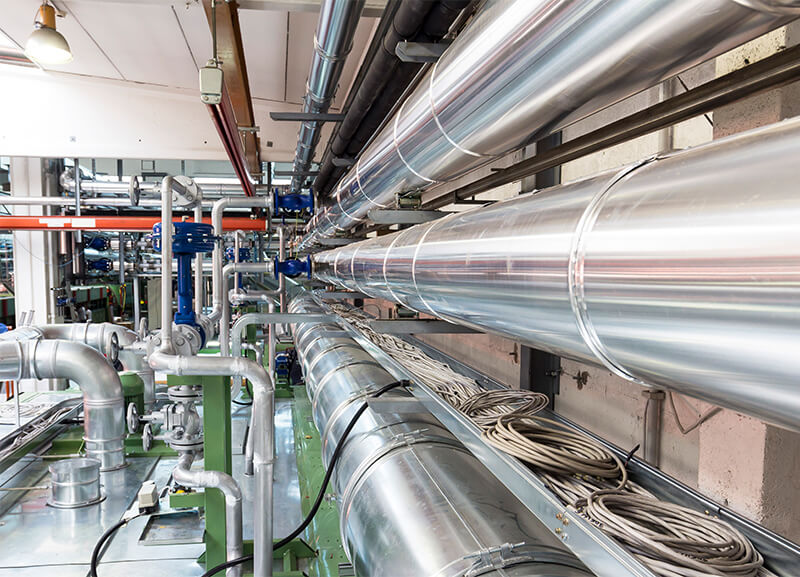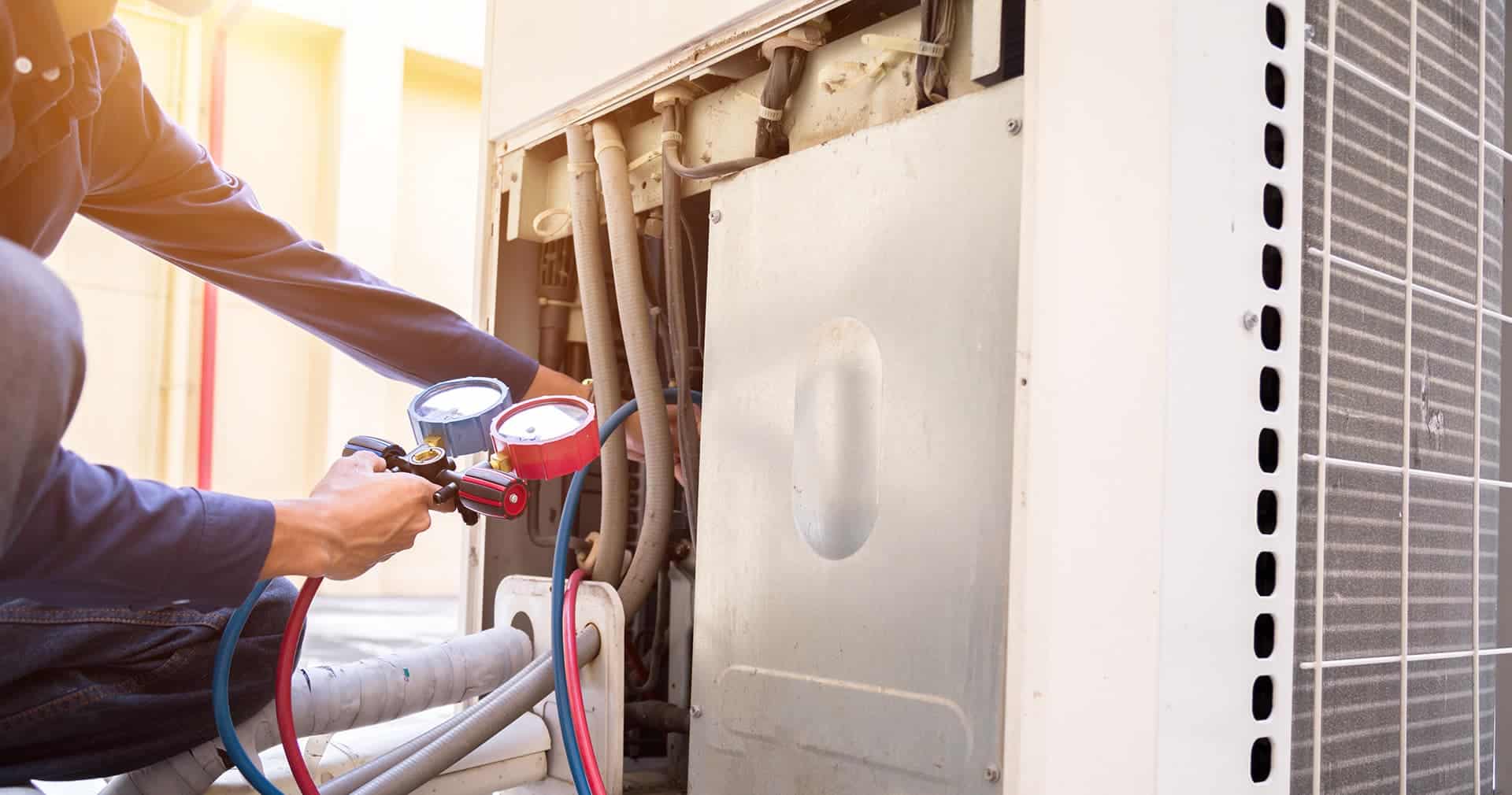Checking Out the Essential Components of a Reliable Heating And Cooling System
An effective a/c system is improved a number of crucial elements that operate in consistency. Each component, from the thermostat to the ductwork, plays an essential role in keeping comfort and energy effectiveness. Recognizing these elements is crucial for maximizing efficiency and improving interior air quality. As one analyzes these components, the intricate connections between them expose understandings into improving total system efficiency. What certain elements contribute most to this performance?
The Role of the Thermostat in Cooling And Heating Performance

Often overlooked, the thermostat plays an important function in the performance of Cooling and heating systems. This small tool works as the primary nerve center, controling temperature level settings and making sure ideal comfort within a room. By properly sensing the ambient temperature level, the thermostat connects with the air, heating, and ventilation conditioning devices to keep the preferred environment
An effective thermostat reduces power consumption by turning on the heating and cooling system only when essential, therefore preventing excessive home heating or air conditioning. Modern clever and programmable thermostats enhance this effectiveness additionally by enabling individuals to set routines and remotely adjust setups, adapting to day-to-day routines.
Moreover, the placement of the thermostat is vital; improper place can lead to incorrect temperature level readings, resulting in inefficient operation. Overall, a well-functioning thermostat not only boosts convenience but also adds substantially to energy savings and the durability of the HVAC system.
Understanding the Importance of Air Filters
Air filters offer a crucial function in heating and cooling systems by ensuring that the air distributing within an area continues to be healthy and tidy. These filters trap dirt, allergens, and other contaminants, avoiding them from being recirculated throughout the setting. By recording these bits, air filters add to boosted interior air quality, which can greatly benefit passengers' wellness, specifically those with allergic reactions or breathing problems.
In addition, keeping clean air filters improves the performance of cooling and heating systems. Blocked filters can restrict airflow, creating the system to work more difficult to keep desired temperatures, resulting in boosted power usage and higher utility expenses. Consistently replacing or cleaning filters is an essential maintenance step that can extend the lifespan of HVAC tools. Eventually, comprehending the relevance of air filters enables homeowners and building supervisors to take proactive actions to guarantee a well-functioning, effective HVAC system that advertises a secure and comfy interior atmosphere.

The Functionality of the Heating System and Heatpump
Heaters and heatpump are essential parts of cooling and heating systems, in charge of providing heat during cooler months. Furnaces run by heating air with combustion or electric resistance, after that dispersing it throughout the home by means of air ducts. They usually use fast home heating and can be fueled by gas, power, or oil, relying on the system type.
On the other hand, warmth pumps move warm instead of produce it. They remove warm from the outside air or ground, also in low temperatures, and move it indoors. HVAC experts. This dual functionality permits heatpump to additionally offer cooling in warmer months, making them flexible options for year-round climate control
Both systems require correct upkeep to guarantee performance and long life. While furnaces succeed in severe chilly, heatpump can be beneficial in moderate environments. Recognizing their unique functionalities aids home owners in picking one of the most suitable option for their home heating requires.
Checking Out the Air Conditioning Device
The air conditioning device is an important element of heating and cooling systems, available in numerous types to match various demands. Comprehending the performance rankings of these devices is vital for making notified choices regarding power intake and expense. This section will check out the varied kinds of ac system and clarify exactly how efficiency scores impact efficiency.
Kinds of Air Conditioners
While various aspects influence the choice of air conditioning systems, recognizing the different types readily available is important for house owners and structure supervisors alike. Central air conditioners are designed to cool whole homes or buildings, using a network of air ducts for air movement. Home window devices use a more local option, perfect for small spaces or single spaces. Portable a/c unit supply adaptability, enabling individuals to relocate the system as required. Ductless mini-split systems are another alternative, incorporating the performance of main systems with the ease of zoning, as they need no ductwork. Geothermal systems harness the planet's temperature level for energy-efficient cooling. Each kind features unique advantages, making notified selections crucial for reliable environment control.

Efficiency Rankings Clarified
Recognizing get more info efficiency ratings is crucial for choosing the appropriate air conditioning device, as these metrics supply understanding into the system's performance and energy usage. The most typical ranking for ac unit is the Seasonal Energy Performance Ratio (SEER), which gauges the cooling outcome throughout a normal cooling period split by the total electrical power input. A higher SEER indicates far better efficiency. In addition, the Energy Performance Proportion (EER) is utilized for determining performance under details problems. Another essential metric is the Energy Celebrity certification, which indicates that a system satisfies strict power effectiveness guidelines. By examining these rankings, consumers can make enlightened selections that not just optimize comfort but likewise minimize energy prices and environmental impact.
The Value of Ductwork and Air movement
Effective ductwork design and air movement administration play vital roles in the overall efficiency and performance of heating and cooling systems. Appropriate ductwork assurances that conditioned air is dispersed evenly throughout a space, decreasing temperature level fluctuations and boosting comfort. Properly designed ducts lessen resistance to air flow, lowering the workload on HVAC equipment and ultimately lowering power consumption.
Air flow administration entails tactically positioning vents and registers to boost the flow of air. This protects against usual concerns such as hot or cool spots, which can take place when air movement is blocked or inadequately balanced. Additionally, the right duct products and insulation can even more boost efficiency by lowering heat loss or gain during air transit.
A reliable ductwork system not only adds to power financial savings yet can additionally extend the life expectancy of cooling and heating equipment by decreasing unnecessary strain (HVAC experts). Comprehending the value of ductwork and air movement is important for achieving peak Cooling and heating system efficiency.
Routine Upkeep Practices to Boost Performance
Routine upkeep techniques are necessary for making sure peak efficiency of HVAC systems. These methods include regular inspections, cleansing, and essential fixings to keep the system running effectively. Regularly transforming air filters is essential, as blocked filters can obstruct airflow and reduce performance. In addition, specialists ought to inspect and tidy evaporator and condenser coils to avoid overheating and energy waste.
Yearly expert inspections are likewise advised, as qualified professionals can identify prospective issues prior to they intensify. Lubricating moving components minimizes damage, adding to a much longer life expectancy for the system. Furthermore, ensuring that the thermostat operates appropriately help in preserving excellent temperature level control.

Frequently Asked Questions
Exactly how Frequently Should I Change My Thermostat?
Thermostats should generally be changed every 5 to ten years, depending upon usage and modern technology advancements. Normal checks are recommended to assure peak efficiency, specifically if experiencing irregular temperature level control or increased power expenses.
What Dimension Air Filter Is Ideal for My A/c System?
The very best size air filter for an a/c system differs by unit layout. Typically, it's crucial to consult the owner's guidebook or examine the existing filter dimensions to assure peak performance and air top quality.
Can I Set Up a Heat Pump Myself?
Installing a heatpump independently is possible for knowledgeable individuals, but it requires knowledge of regional codes and electrical systems. Hiring an expert is recommended to assure proper installation and excellent system efficiency.
How Do I Know if My Ductwork Is Reliable?
To determine ductwork efficiency, one should inspect for leaks, step air movement at vents, inspect insulation high quality, and evaluate temperature distinctions in between supply and return ducts. Professional analyses can give extensive understandings right into overall performance.
What Are Indications My A/c Needs Immediate Upkeep?
Indicators that an a/c system requires instant upkeep consist of unusual sounds, irregular temperature levels, raised power expenses, unpleasant odors, and constant cycling. Attending to these concerns promptly can stop additional damages and assurance optimal system performance.
Air filters serve an essential feature in Cooling and heating systems by ensuring that the air flowing within an area stays healthy and balanced and tidy. Furthermore, preserving tidy air filters enhances the effectiveness of HVAC systems. Ductless mini-split systems are another option, integrating the performance of main systems with the comfort of zoning, as they require no ductwork. Recognizing effectiveness scores is crucial for picking the best air conditioning device, as these metrics provide understanding into the system's efficiency and energy intake. The finest dimension air filter for a HVAC system varies by unit style.